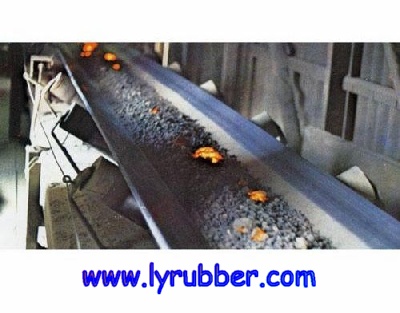
Heat Resistance Conveyor Belt 200℃
Heat Resistance Conveyor Belt
Hot transported material can very easily damage the conveyor belt. To prevent possible damages, special high temperature resistance canvas with high modulus, low shrink and high breaking tensile strength is adopted as carcass. And EPDM rubber or Chloro-butyl rubber with good heat-resistant performance is used as cover rubber. By mixing some other high-temperature resistance materials and with advanced technique, the belt made better performance in heat resistance. That not only solves the fabric shrinkage and deformation problems, but also avoids crucial poor adhesion problem caused by high degree of saturation of ethylene propylene rubber. The belt is excellent in heat resistance, low elongation, light and with longer using life, etc.
Application: cement plants, heating stations, power stations, garbage incineration plants, chemical industry, steelworks, metal foundries and metal processing industry, etc.
Two conditions for reference regarding choice of HR Belt:
Because of the difference of the material and grain size, the surface temperature of the conveyor belt is different. Bulk materials such as coke and iron ore have gaps,it causes the air convection, so the temperature on the belt surface is lower than that of the transported materials.
When conveying small size material or powder, such as cement, aluminum, carbon black, etc. The temperature of the material conveyed is mostly the same as that on the belt surface, in this case, when choose the belt type, not only the conveyed material temperature has to be known but also the actual heat state of the belt surface has to be gotten.
Heat Resistance Conveyor Belt
Hot transported material can very easily damage the conveyor belt. To prevent possible damages, special high temperature resistance canvas with high modulus, low shrink and high breaking tensile strength is adopted as carcass. And EPDM rubber or Chloro-butyl rubber with good heat-resistant performance is used as cover rubber. By mixing some other high-temperature resistance materials and with advanced technique, the belt made better performance in heat resistance. That not only solves the fabric shrinkage and deformation problems, but also avoids crucial poor adhesion problem caused by high degree of saturation of ethylene propylene rubber. The belt is excellent in heat resistance, low elongation, light and with longer using life, etc.
Application: cement plants, heating stations, power stations, garbage incineration plants, chemical industry, steelworks, metal foundries and metal processing industry, etc.
Two conditions for reference regarding choice of HR Belt:
Because of the difference of the material and grain size, the surface temperature of the conveyor belt is different. Bulk materials such as coke and iron ore have gaps,it causes the air convection, so the temperature on the belt surface is lower than that of the transported materials.
When conveying small size material or powder, such as cement, aluminum, carbon black, etc. The temperature of the material conveyed is mostly the same as that on the belt surface, in this case, when choose the belt type, not only the conveyed material temperature has to be known but also the actual heat state of the belt surface has to be gotten.
Certificate
- DIS
- DIN
- AS
- BS
- ISO
- N
- N17
- GB
- BS
- JIS
- SABS
- and RMA
- etc.
Main Products
rubber conveyor belt,rubber dam ,rubber sheet/mat
